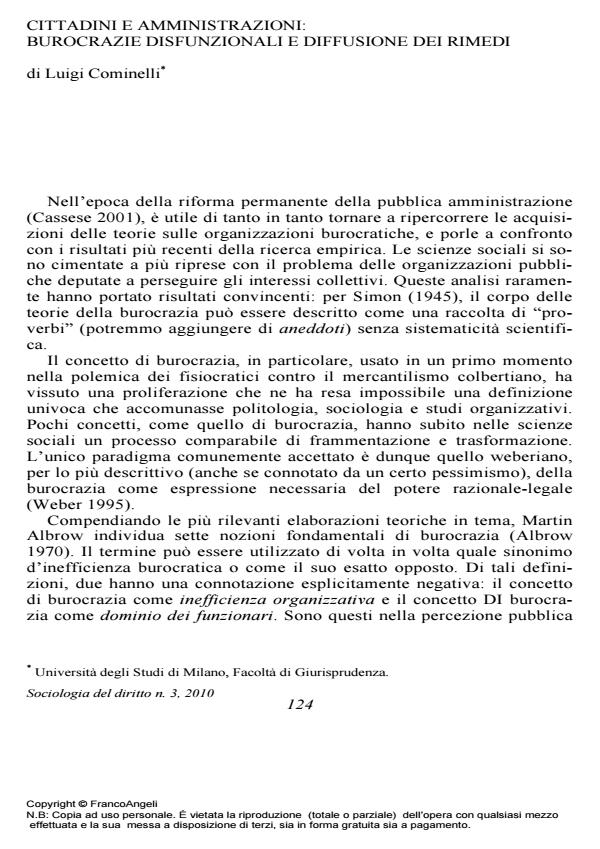Citizens and administration: dysfunctional bureaucracy and the dissemination of remedies
Journal title SOCIOLOGIA DEL DIRITTO
Author/s Luigi Cominelli
Publishing Year 2011 Issue 2010/3
Language Italian Pages 10 P. 124-133 File size 332 KB
DOI 10.3280/SD2010-003011
DOI is like a bar code for intellectual property: to have more infomation
click here
Below, you can see the article first page
If you want to buy this article in PDF format, you can do it, following the instructions to buy download credits

FrancoAngeli is member of Publishers International Linking Association, Inc (PILA), a not-for-profit association which run the CrossRef service enabling links to and from online scholarly content.
The concept of bureaucracy has undergone a degree of proliferation that has made it impossible to furnish a single, unequivocal definition of it common to the social sciences. The only paradigm that is commonly agreed on is Weber’s definition of bureaucracy as a necessary expression of rational legal power. Nevertheless, the concept of bureaucracy conveys two explicitly negative connotations that are perceived by the general public as its two greatest problems: the inefficiency of public organisations and the arbitrary behaviour of its officials. Itemising the characteristics of the bureaucratic personality, Merton includes ritualism and deresponsibilisation. Crozier also notes that the larger and more complex that organisations become, the higher the level where responsibility for decision-making is vested, creating a decision-making bottleneck. The empirical research conducted by Jochimsen in Germany seems to confirm that an increase in an organisation’s dimensions can generate significant diseconomies of scale. More recently, the theories of public choice have contested the assumption that officials interpret the public interest. Lastly, the crisis of the welfare state has led to a containment of public organisations and to the rise of the doctrine of new public management, which preaches the superiority of the private sector and suggests the introduction of the mechanisms of the market and of competition in the public sector. Despite the radical transformations wrought by new public management, scepticism towards public organisations is widespread in all Western countries, as recent surveys conducted at European level by the Eurobarometer have demonstrated. In conclusion, the article mentions the empirical research conducted to establish the effectiveness of ombudsmen in influencing the public’s perception of bureaucracy and in changing its practices.
Keywords: Bureaucracy, Public administration, Theories of public choice, Organisations, New public management, Ombudsman
Luigi Cominelli, Cittadini e amministrazioni: burocrazie disfunzionali e diffusione dei rimedi in "SOCIOLOGIA DEL DIRITTO " 3/2010, pp 124-133, DOI: 10.3280/SD2010-003011